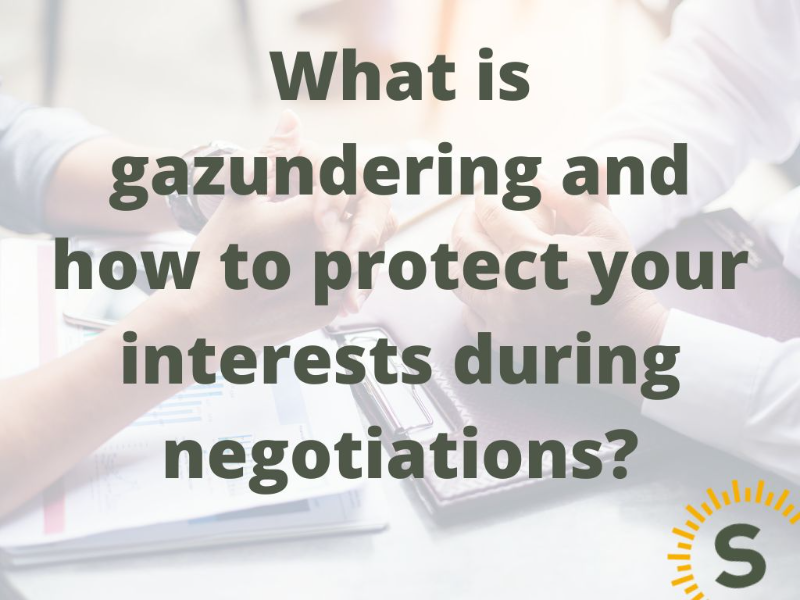
Are you familiar with the term "gazundering"? It's a sneaky tactic that has become increasingly prevalent in property negotiations. It's important to understand how to spot a gazunder and not be taken advantage of.
It's becoming more common and knowing how to prevent it from occurring and protect yourself can give you an upper hand when selling your property.
In this insight, we will cover what is gazundering and how to protect your interests during property negotiations.
Gazundering occurs when a buyer lowers their offer at the last minute, just before the deal is about to close. This can leave sellers feeling frustrated, betrayed, and at a loss for how to protect their interests.
Gazundering can occur at various stages of property negotiations. One common scenario is when a buyer lowers their offer just before the exchange of contracts. This sudden reduction in price can catch sellers off guard and put them in a vulnerable position. Another instance is when the buyer wants a reduction after survey or offer. In both cases, gazundering can leave sellers feeling frustrated and uncertain about how to protect their interests.
Both gazumping and gazundering are legal in England and Wales where the property-buying process is unregulated. These practices are far less common in Scotland thanks to the 'sealed bid' system - once an offer is accepted it is legally binding and there are penalties if buyers back out.
Gazundering can have serious consequences for sellers, making it important to fully grasp the risks and implications involved. One of the main risks is financial loss. When a buyer lowers their offer at the last minute, it can leave sellers in a compromised position, especially if they have already made financial commitments based on the initial agreed-upon price. This can result in a significant loss of profit or even a failed transaction.
Another implication of gazundering is the emotional toll it can take on sellers. Negotiations can be stressful, and when a buyer suddenly reduces their offer, it can lead to feelings of frustration, anger, and betrayal. Sellers may feel pressured to accept the lower offer due to time constraints or fear of losing the deal altogether. This can leave a lasting negative impact on their overall experience and trust in future negotiations.
To protect yourself from the risks and implications of gazundering, it's crucial to be proactive and employ effective strategies throughout the negotiation process.
Gazundering is a strategic move on the buyer's part, and they often employ certain tactics to maximise their chances of success. By familiarising yourself with these tactics, you can better anticipate and counteract them during negotiations.
One common tactic is to create a sense of urgency. Buyers may wait until the last minute to lower their offer, putting pressure on sellers to make a quick decision. This can make sellers more susceptible to accepting a lower price to avoid losing the deal altogether. Another tactic is to highlight flaws or issues with the property or business being negotiated. By pointing out perceived shortcomings, buyers can attempt to justify their reduction in offer.
To protect your interests, it's important to be aware of these tactics and not let them sway your decision-making. Stay calm, evaluate the situation objectively, and be prepared to negotiate effectively.
Now that we understand the risks and tactics associated with gazundering, let's discuss practical steps to protect your interests during negotiations. Implementing these strategies can help you navigate the negotiation process with confidence and minimise the potential impact of gazundering.
One of the key ways to protect yourself from gazundering is to set a realistic initial asking price. Conduct thorough research on the current market conditions and comparable properties to determine a fair and competitive price range. Setting an asking price that is too high may deter potential buyers, while setting it too low could leave you vulnerable to lowball offers.
To negotiate effectively, it's important to have a deep understanding of the market and comparable properties. Research recent sales in the area, assess the current demand, and analyse any unique features or selling points of your property or business. Armed with this knowledge, you can confidently counter any attempts to lower your asking price without a valid reason.
A strong negotiating position is crucial in protecting your interests. Focus on highlighting the positive aspects of your property or business and be prepared to present compelling reasons why your asking price is fair. Showcase any recent improvements or potential for future growth to demonstrate the value that you're offering.
Open and transparent communication is key in any negotiation. Clearly express your expectations and concerns to the buyer or seller, and actively listen to their perspective. By establishing clear lines of communication, you can build trust and increase the likelihood of a successful negotiation.
Contracts and legal protections are essential tools in safeguarding your interests during negotiations. Ensure that all agreements are documented in writing and clearly outline the terms and conditions of the sale. Consult with a solicitor or estate agent to ensure that your legal rights are protected throughout the process.
The buyer is under no obligation to provide a copy of the survey to the seller. However, if they have flagged an issue and they are being legitimate, there should be no reason why they would not provide it. Once you have a copy, you can obtain a second opinion on the cost of works required to fix any mentioned issues.
**** 4.2

If you're feeling overwhelmed or unsure about navigating negotiations on your own, don't hesitate to seek professional advice. Real estate agents and solicitors have extensive experience in negotiating and can provide valuable guidance tailored to your specific situation. Their expertise can help you navigate the complexities of the negotiation process and protect your interests effectively.
To further illustrate the strategies discussed, let's take a look at a few case studies and examples of successful negotiations where sellers were able to protect their interests from gazundering.
Sarah, a homeowner, received a lower offer just days before the closing date. However, she had conducted thorough research on market prices and was confident in her asking price. Sarah calmly and confidently explained her reasoning to the buyer, emphasising the unique features of her property. The buyer eventually agreed to her original asking price, recognising the value she was offering.
John, a business owner, was negotiating the sale of his small retail store. The buyer attempted to lower the price by pointing out minor maintenance issues. However, John had already obtained quotes for the repairs and was prepared to counter the lower offer by deducting the cost of the repairs. The buyer, recognising that John had a strong negotiating position, agreed to the revised offer.
In both cases, the sellers were able to protect their interests by employing effective negotiation strategies and staying true to their initial asking price.
Gazundering can be a challenging and frustrating experience for sellers, but by understanding the risks, tactics, and strategies involved, you can protect your interests and navigate negotiations successfully. Setting a realistic initial asking price, conducting thorough research, building a strong negotiating position, communicating effectively, utilising legal protections, and seeking professional advice are all key steps in safeguarding your interests.
Gazundering Revenge is an alternative consideration where sellers employ black hat tactics to "win" the psychological battle of the gazunder.
Remember, negotiation is a two-way process, and it's important to approach it with confidence, knowledge, and a clear understanding of your own value. By implementing these strategies and empowering yourself with the right information, you can minimise the impact of gazundering and negotiate with confidence in any property transaction.

Stuart is an expert in Property, Money, Banking & Finance, having worked in retail and investment banking for 10+ years before founding Sunny Avenue. Stuart has spent his career studying finance. He holds qualifications in financial studies, mortgage advice & practice, banking operations, dealing & financial markets, derivatives, securities & investments.





Our website offers information about financial products such as investing, savings, equity release, mortgages, and insurance. None of the information on Sunny Avenue constitutes personal advice. Sunny Avenue does not offer any of these services directly and we only act as a directory service to connect you to the experts. If you require further information to proceed you will need to request advice, for example from the financial advisers listed. If you decide to invest, read the important investment notes provided first, decide how to proceed on your own basis, and remember that investments can go up and down in value, so you could get back less than you put in.
Think carefully before securing debts against your home. A mortgage is a loan secured on your home, which you could lose if you do not keep up your mortgage payments. Check that any mortgage will meet your needs if you want to move or sell your home or you want your family to inherit it. If you are in any doubt, seek independent advice.